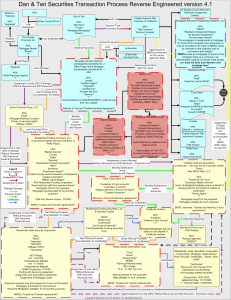Glaski vs Bank of America NA et al – FOR PUBLICATION
 By Daniel Edstrom
By Daniel Edstrom
DTC Systems, Inc.
On August 8, 2013 the Fifth Appellate District in the Court of Appeal of the State of California ordered the Thomas A. Glaski vs Bank of America, NA et al decision published, stating:
As the nonpublished opinion filed on July 31, 2013, in the above entitled matter hereby meets the standards for publication specified in the California Rules of Court, rule 8.1105(c), it is ordered that the opinion be certified for publication in the Official Reports.
Based on the importance of this case, the text of the July 31, 2013 ruling is listed verbatim:
IN THE COURT OF APPEAL OF THE STATE OF CALIFORNIA
FIFTH APPELLATE DISTRICT
| THOMAS A. GLASKI,Plaintiff and Appellant,v.
BANK OF AMERICA, NATIONAL ASSOCIATION et al.
Defendants and Respondents. |
F064556
(Super. Ct. No. 09CECG03601)
OPINION
|
APPEAL from a judgment of the Superior Court of Fresno County. Alan M. Simpson, Judge.
Law Offices of Richard L. Antognini and Richard L. Antognini; Law Offices of Catarina M. Benitez and Catarina M. Benitez, for Plaintiff and Appellant.
AlvaradoSmith, Theodore E. Bacon, and Mikel A. Glavinovich, for Defendants and Respondents.
-ooOoo-
INTRODUCTION
Before Washington Mutual Bank, FA (WaMu) was seized by federal banking regulators in 2008, it made many residential real estate loans and used those loans as collateral for mortgage-backed securities.[1] Many of the loans went into default, which led to nonjudicial foreclosure proceedings. Some of the foreclosures generated lawsuits, which raised a wide variety of claims. The allegations that the instant case shares with some of the other lawsuits are that (1) documents related to the foreclosure contained forged signatures of Deborah Brignac and (2) the foreclosing entity was not the true owner of the loan because its chain of ownership had been broken by a defective transfer of the loan to the securitized trust established for the mortgage-backed securities. Here, the specific defect alleged is that the attempted transfers were made after the closing date of the securitized trust holding the pooled mortgages and therefore the transfers were ineffective.
In this appeal, the borrower contends the trial court erred by sustaining defendants’ demurrer as to all of his causes of action attacking the nonjudicial foreclosure. We conclude that, although the borrower’s allegations are somewhat confusing and may contain contradictions, he nonetheless has stated a wrongful foreclosure claim under the lenient standards applied to demurrers. We conclude that a borrower may challenge the securitized trust’s chain of ownership by alleging the attempts to transfer the deed of trust to the securitized trust (which was formed under New York law) occurred after the trust’s closing date. Transfers that violate the terms of the trust instrument are void under New York trust law, and borrowers have standing to challenge void assignments of their loans even though they are not a party to, or a third party beneficiary of, the assignment agreement.
We therefore reverse the judgment of dismissal and remand for further proceedings.
Continue reading “Glaski vs Bank of America NA et al – FOR PUBLICATION”


 By Daniel Edstrom
By Daniel Edstrom





